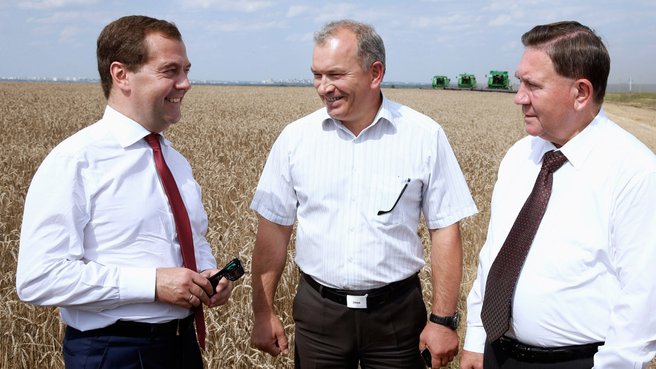Transcript:
Dmitry Medvedev: Good afternoon. It is clear why we are meeting now – the harvesting campaign in August is in full swing. Naturally, we’ll discuss progress with field work. According to recent information, grain crops were harvested almost from half of the fields as of August 20. More than 53 million tonnes of grain have been ground – this is roughly 5.5 million tonnes more than during last year. The average crop yield is also higher for the time being – 25.8 centners per hectare. The forecast for the year remains generally positive – about 90 million tonnes – although initially we expected to receive about 95 million tonnes. We had to adjust this forecast because of the weather.
Naturally, the situation is the worst in the Far East. The flood that still continues in some areas of the Far Eastern Federal District has destroyed almost half of the harvest on 0.5 million hectares, or even more in some places. There are serious apprehensions about the conditions of the soil and in particular forage lands. The potential damage is running into the billions of roubles and this is a tough fact.
We must help the agricultural producers hit by the flood. Let’s start thinking about this now. We must estimate the damage in cooperation with the flood-affected regions and decide how to support agricultural producers. The Ministry of Agriculture and other profile departments should make specific proposals to this end based on an appraisal by experts on site and their suggestions.
One more important task is to monitor the food market in the Far East. It is inadmissible to let anyone profit from someone else’s misfortune. It is necessary to consider the supplies of potatoes and other vegetables, as well as grain, fodder and seeds for acceptable prices from other regions to prevent shortages and price distortions.
Now let’s switch to current affairs. This year we launched a new state programme for agricultural development and agricultural market regulation. It provides for federal budget allocations of over 60 billion roubles for supporting plant growing. Recently, the Government distributed a number of subsidies. Some of them were paid to reimburse agricultural producers for part of the interest rate on short-term loans. Plant growers have received almost 20 billion roubles and I signed a resolution on August 6 on granting them an additional 12 billion roubles.
The budget allocates over 25 billion roubles in green box subsidies for plant growers this year plus an additional 10 billion roubles (I signed a relevant resolution on July 30). I’d like the governors and the heads of agricultural companies to report on per hectare subsidising. We spoke about this right in the fields. This is a new mechanism that evokes certain mistrust. It seemed like it provided less support. However, we counted then, and received the same figures as before. Our task is to provide adequate financial assistance to agricultural producers now that we are among the WTO’s members.
Today, I’ve also signed a Government directive on subsidies for economically important regional programmes – plant growers will receive 3 billion roubles and stock breeders about 8 billion roubles. I hope that this will help agricultural producers to stabilise their production.
Let me repeat that all of the government funds must be timely and fully transferred to agricultural producers – this is the task of the regional authorities. Many of those present here have told me repeatedly about another problem. It is not linked directly to the harvest; it is linked to the future development of agriculture. This is the so-called indebtedness on extending subsidies on investment loans; this refers to plant breeding and livestock farming. According to the Ministry of Agriculture’s estimates, the total amount reaches up to 25 billion roubles. Unfortunately, these loans were not adequately formalised and registered in the proper time. However, I have issued instructions to inspect all of the liabilities and to take the necessary decisions. These decisions should be prepared within a month, primarily through the redistribution of funds previewed in other areas. I want to stress that these are not the direct liabilities of the federal budget. We are referring to support for the regions. And, in the future, the Ministry of Agriculture must constantly support a register of supported loans, which has not been always done until today.
It is important that borrowings should be added to state support funds. This year, major banks (Rosselkhozbank and Sberbank) operating in the sector have increased the volume of loans by 40% compared to 2012. I want my colleagues to inform me about the loan rates and whether they are acceptable for farmers and what is the overall financial situation of farms.
In addition, one more issue, which I regularly touch upon at such meetings, is the level of crop insurance. This is the most civilised way to reduce seasonal farming risks. About 10% of crops have been insured throughout Russia. This is a very modest figure; crop insurance should develop. We should discuss this issue. I would like to hear information about seed, mineral fertiliser, equipment and fuel supplies for farmers. I would appreciate if I could hear this information from the representatives of farms, and from regional governors, of course. Overall, judging from the information that we are receiving, the situation appears normal. However, let us focus on this issue.
<…>












